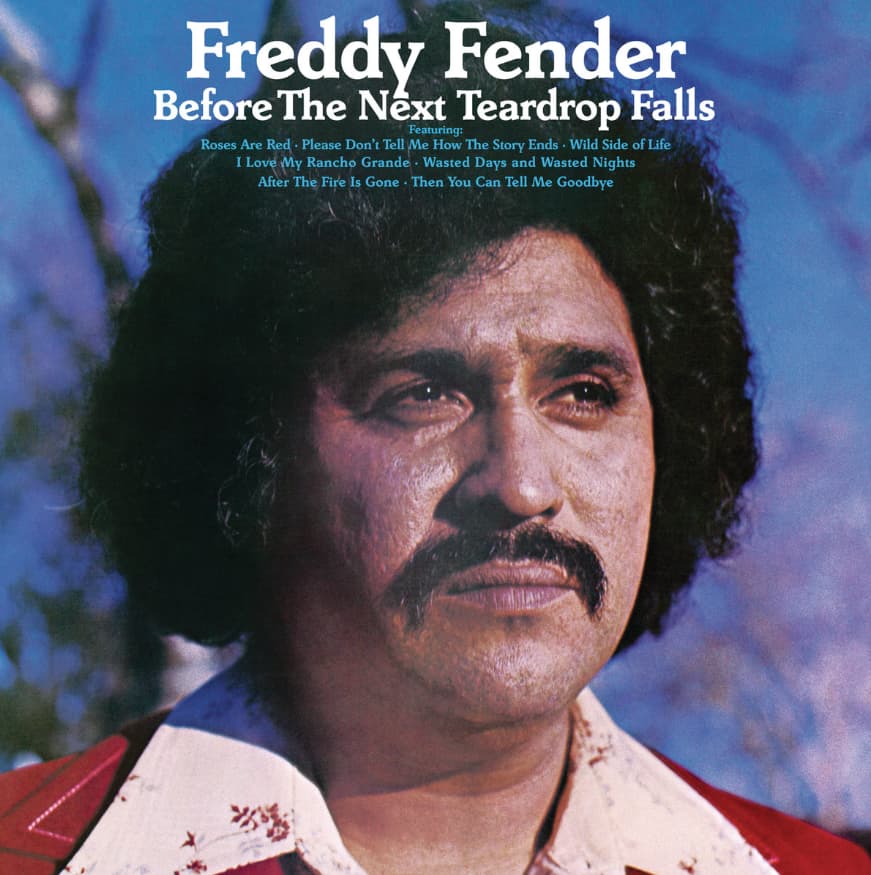
An Unbreakable Promise of Unconditional Love
There are songs that hit you, and then there are songs that stay with you. They become part of the soundtrack of your life, a nostalgic whisper of a time long past, a melody that can still stir the deepest emotions. For many, that song is “Before the Next Teardrop Falls” by the incomparable Freddy Fender. It’s a ballad of such quiet, devastating beauty that it feels less like a performance and more like a private, heartfelt confession. It’s a song that speaks to a universal truth: that sometimes, the most profound acts of love are not grand gestures of possession, but promises of unwavering support, even when the person you love has found happiness elsewhere.
Released in 1975 on the album of the same name, this masterpiece of Tex-Mex country music wasn’t just a hit; it was a phenomenon. It was one of only six songs that year to achieve the rare and impressive feat of topping both the Billboard Hot 100 pop chart and the Hot Country Singles chart. For two weeks in March of that year, it held the number one spot on the country charts before climbing its way to the top of the pop charts in May, a crossover success that defied the usual genre barriers of the era. The song’s success was so significant that it earned Freddy Fender the Country Music Association’s Single of the Year award in 1975, a testament to its widespread appeal and emotional resonance. The song also earned a place in the National Recording Registry of the Library of Congress, a timeless honor cementing its status as a cornerstone of American music.
The story behind the song is as compelling as its melody. Written in 1967 by Vivian Keith and Ben Peters, the song had been recorded more than two dozen times by various artists, including Jerry Lee Lewis and Linda Martell, with only modest chart success. But it was Freddy Fender, born Baldemar Huerta in San Benito, Texas, who breathed new life into it. Producer Huey P. Meaux approached him with an instrumental track and a simple request. What followed was a moment of pure magic. Fender, who had faced numerous challenges in his career, including a prison sentence for drug possession that derailed his initial rise to stardom, was glad to get the recording over with, never imagining the impact it would have.
He recorded the song with a unique, bilingual approach, singing the first half in English and then repeating it in Spanish. The Spanish verse, “Si te quiere de verdad, y te da felicidad, te deseo lo mas bueno pa’ los dos, pero si te hace llorar, a mi me puedes hablar, y estaré contigo cuando triste estás,” translates to, “If he loves you for real, and gives you happiness, I wish the best for you both, but if he makes you cry, you can talk to me, and I’ll be with you when you are sad.” This bilingual delivery wasn’t just a gimmick; it was the heart and soul of the song, a beautiful expression of Fender’s heritage and a bridge between cultures. It was a raw, authentic performance, and that authenticity is what captured the hearts of millions.
For those of us who remember the first time we heard it, the song is a bittersweet echo. It brings back memories of slow dances in dimly lit rooms, of long drives on lonely roads, of late-night conversations and the quiet ache of a love that was meant to be, but never was. The lyrics are a painful yet selfless pledge. It’s the ultimate “if you ever need me” message, a promise to be a sanctuary, a shoulder to cry on, for the person who once held your heart. It’s a testament to the idea that true love isn’t just about being with someone, but about caring for their well-being, even from a distance. Freddy Fender‘s smooth, effortless vocals, with just a hint of a tear in his voice, perfectly convey this message. His performance is a masterclass in conveying deep emotion without a single wasted note or over-the-top flourish. It’s a song for anyone who has ever loved and lost, and found the strength to wish their former love well, while quietly keeping the door open, just in case.